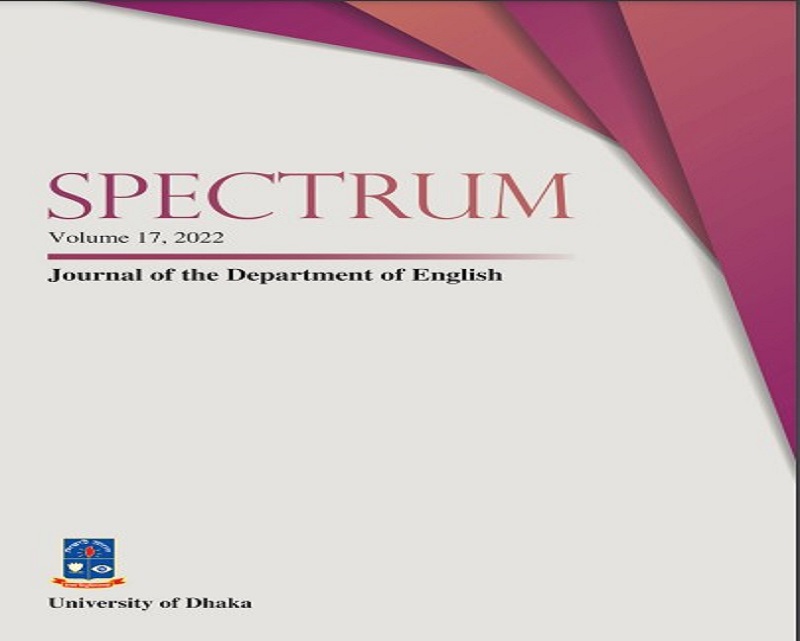
Spectrum Volume 17, 2022
Click here to read more details . . .
EDITORIAL
Greetings from the editorial team! We are delighted to bring to you Volume 17 of Spectrum, Journal of the Department of English, University of Dhaka. As the new editorial team we took over the responsibility of editing the current issue in June 2022, and we would like to mention here that the response we got to the call for papers regarding this issue was overwhelming. We received over twenty articles which were both exciting and overwhelming. We were happy that we received so many articles but at the same time the thought of finding double reviewers and having them peer-reviewed seemed quite a daunting task. Though at times we found it very challenging and extremely demanding, we were able to pull it off, finally. This volume contains eight scholarly articles. The first article by Tahmina Ahmed is about life in the diasporas. Focusing on the literature produced by exiled poets and writers, she attempts to trace the writers’ as well as their fictional characters’ journey from the past through the present and to the future. This article tries to portray how people struggle to adapt to new and strange cultures, how they deal with issues like homesickness, cultural differences, economic struggles and identity crisis. The next article by Nevin Farida focuses on writing. In this research article Farida uses the Swalesian Move strategy to analyze English literature essays by first-year students of the English department. She analyses how students express their ideas and what structural patterns they follow while writing the essays. Her findings have implications for improving our academic writing courses. The problems of pronunciation is explored in Mohammad Shahedul Haque and Nashrah Sharfuddin’s article. This article examines the front vowels of English and Dutch from a contrastive standpoint. The authors explain why the English front monophthong system is likely to pose a greater challenge for Dutch learners. Lungi, the most common informal clothing of Bangladeshi men, is the subject of Rifat Mahbub’s article where she explores how this simple piece of clothing plays a very active and symbolic role at different stages of struggle from pre-colonial East Bengal to presentday Bangladesh. Masrufa Alam’s article concentrates on some characters of Amitav Ghosh’s Shadow Lines. Alam tries to show how different characters in this novel have different notions of freedom and home, and how they come to terms with their lives in the adopted country. A critical perspective is presented by Khadizatul Kobra Urmy’s article, where Ecofeminism is the focal point. Focusing on two Bangladeshi films Haldaa, and Padmapuran, the author tries to shed light on the interdependence of nature and women. The article by Maria Mollah looks at the horror genre. Mollah in her article uses the psychoanalytic approach to analyze and explore the roles of dreams in the works of H.P. Lovecraft. iv A similar approach is also used in the next article. Delving deep into the minds of two interesting characters – Meursault of The Outsider by Camus and Arthur Fleck, the protagonist of the film Joker (2019) – Sifatur Rahim attempts to explore the workings of the unconscious and its manifestation in Fleck and Meursault’s actions. The journal ends with a review of the book Dhaka University’s English Department: Critical Perspectives (Farida et al., 2022) by Syed Foyez Ahmed. The author presents a critical summary of the book chapters and how the book can be useful for students, teachers and researchers interested in the history of the department. Finally, as the editor, I am grateful to the authors for their contributions, and to the reviewers for their insightful feedback. I am also thankful to my editorial team members for their time, hard work and team spirit. The papers of this volume address current issues in Literature, the Arts, Applied Linguistics and ELT. I hope the readers will find the papers interesting and worth reading.
Professor Begum Shahnaz Sinha